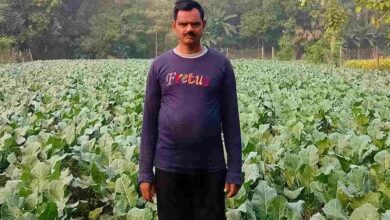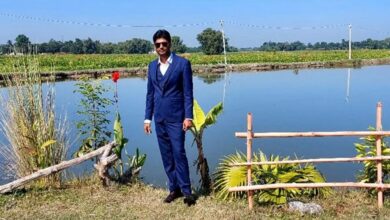Success Story: This farmer from Maharashtra brought revolution in agriculture through natural farming
Success Story: A 73-year-old farmer from Maharashtra’s Yavatmal district named Subhash Khetulal Sharma has made his 16-acre farm a natural agricultural model. He has devoted his life to establishing a harmonic balance between farming and the environment via sustainable agriculture methods. He has gained international attention for his creative agricultural methods that put production and environmental health first.

As part of the Padma Awards 2025, his groundbreaking effort was recognized with the Padma Shri award, which celebrated his exceptional contribution to farming and his dedication to sustainability.
The Transformation of a Farming Family into a Skilled Cultivator
Subhash comes from a family of farmers. Since 1970, he has been farming land. He is quite knowledgeable about agriculture. Sharma has created a farming system that prioritizes ecological balance, water conservation, and soil health. Depending on the season, he grows a variety of crops on his property. According to agricultural practice, India has three distinct seasons.
During the wet season, he grows horticulture crops, groundnuts, pigeon peas, turmeric, and pumpkins. He spends the winter growing tomatoes, radishes, fenugreek, and coriander. His harvest is just one aspect of his commitment to agriculture. Sharma has made it his life’s work to restore natural agricultural practices in order to undo the damages caused by overuse of chemicals.
Transition to Organic Farming
When Sharma saw that his agricultural yields had drastically dropped, he made the decision to stop using chemicals in 1994. Then he saw how the overuse of chemical pesticides and fertilizers was disrupting the natural balance and eroding the land’s fertility.
He turned to natural farming as a result of this insight. His efforts started to pay dividends by the year 2000. In addition to a drop in input expenditures, his farm’s production rose from 50 to 400 tons. “Natural farming is about nurturing the land, not exploiting it,” he said, attributing this achievement to nature’s capacity for regeneration.
A Sustainable Agriculture Vision
The farm owned by Subhash Sharma is designed to be an ecosystem that can maintain itself. His official agriculture planning entails:
- 2% of the land is used for animal husbandry, which makes a substantial contribution to the production of organic manure.
- Three percent of the land is used for rainwater harvesting, which collects and conserves water.
- 30% of the land should be planted with trees to improve biodiversity and provide natural shade and nutrients. His recommendation is to plant fruit plants in order to diversify and generate income.
- In addition to enriching the soil with nutrients, multi-crop agriculture occupies 65% of the field and produces continuously throughout the year.
Sharma emphasizes the need for seeing agriculture as a cohesive system that maintains biodiversity, soil, and water. His approaches are based on five fundamental ideas: crop planning, water retention, indigenous seed preservation, soil conservation, and effective labor management.
Agriculture’s Problems and Solutions
Sharma cautions that climate change, soil erosion, water shortages, environmental imbalance, and farmers’ lack of social respect are all contributing factors to the current agricultural catastrophe. “We will fail if we fail to take climate change into account while farming. He warns that we only have around seven years left to take action.
A reorganized agricultural system is what Sharma suggests. Farmers will get direct financial incentives under this system in exchange for recovering the soil, saving water, and maintaining ecological balance. In order to replenish groundwater and avert a water disaster, he supports extensive water conservation initiatives at the local level.
Influence and Acknowledgment
Sharma’s farm serves as a center for ecological rehabilitation in addition to providing food. Every year, he saves one crore gallons of rainfall. Additionally, he uses just six acres of land to replenish six crore gallons of groundwater. He has contributed Rs. 120 crores to water conservation alone. This illustrates how natural farming has enormous social benefits.
As a farmer, he imparts his wisdom to those making the shift to sustainable farming methods. According to him, a successful farmer has to work in four areas: biomass optimization, bird movement facilitation, tree planting, and cow husbandry. His ideology tackles the underlying reasons for farmers’ difficulties rather than just agricultural methods.
He urges society and government to properly acknowledge the value of agricultural workers and encourages them to take action. “We need empathy for the farmer instead of pity. He will be forced to work somewhere else if you don’t pay him enough for his output.
Even though Sharma is in his 70s, he still puts in a lot of effort on his farm. He thinks that a fundamental movement toward natural farming will define the direction of agriculture in the future. He has urged the government to enact laws that put ecological harmony ahead of immediate financial gain. “The government must recognize natural farming as the foundation of future agriculture and act accordingly,” he maintains.





